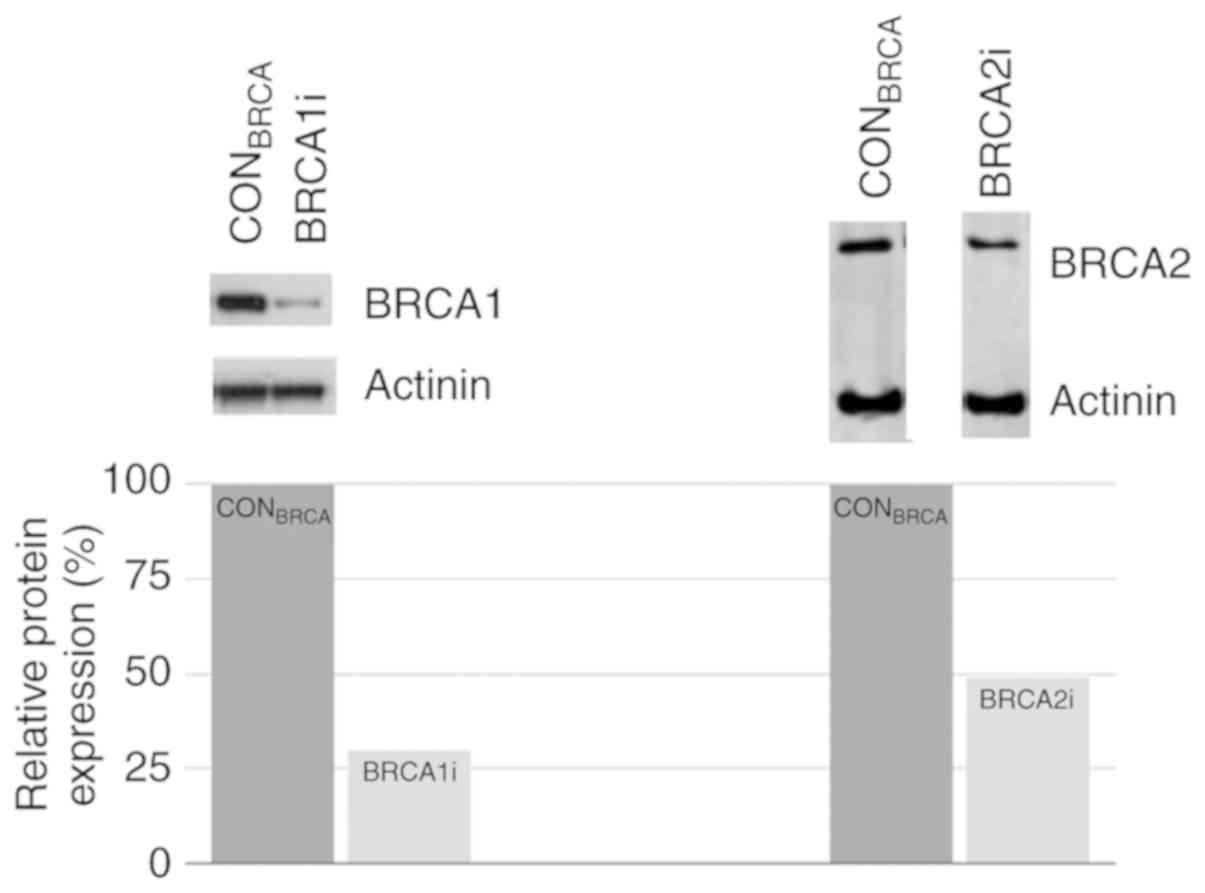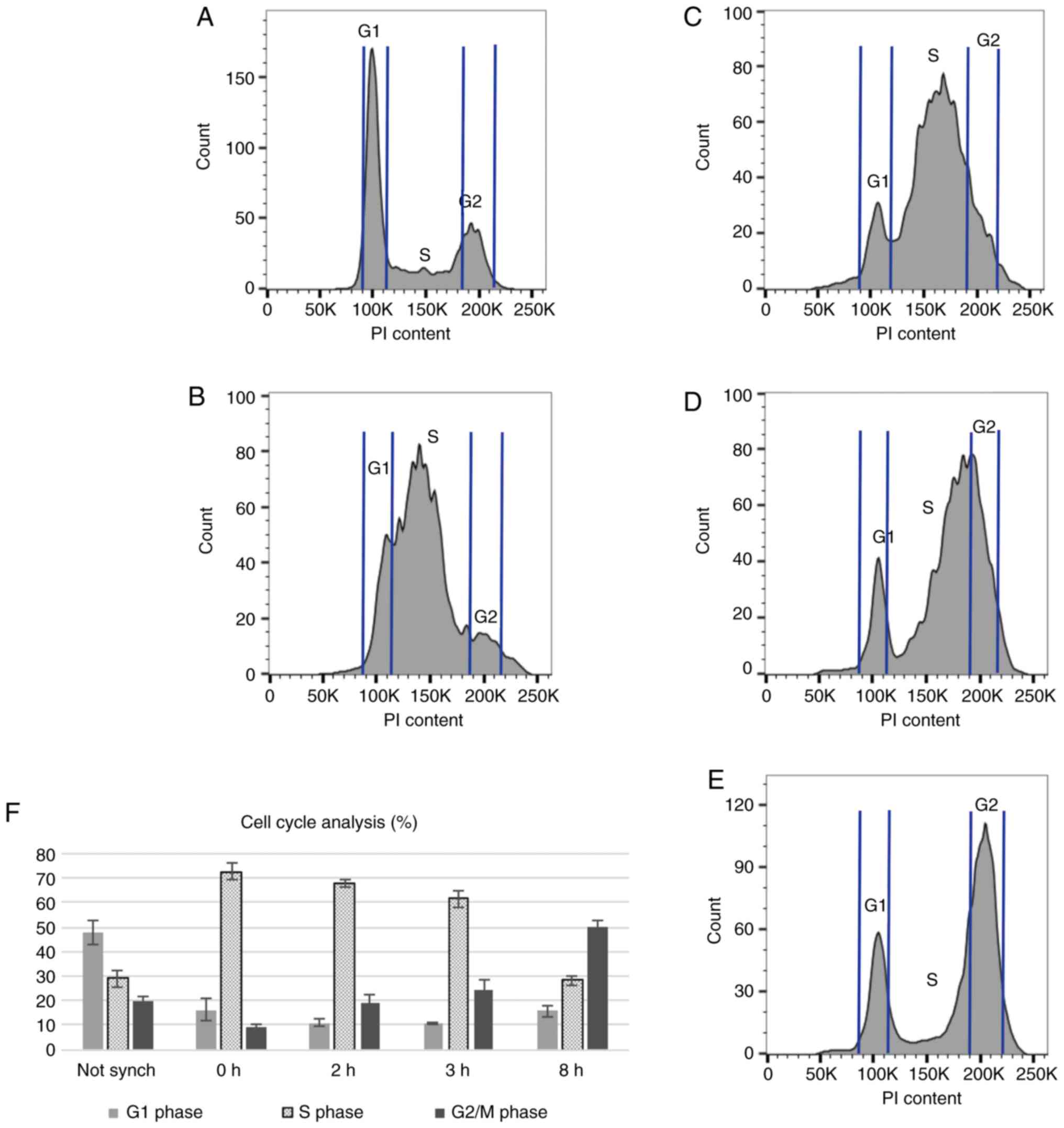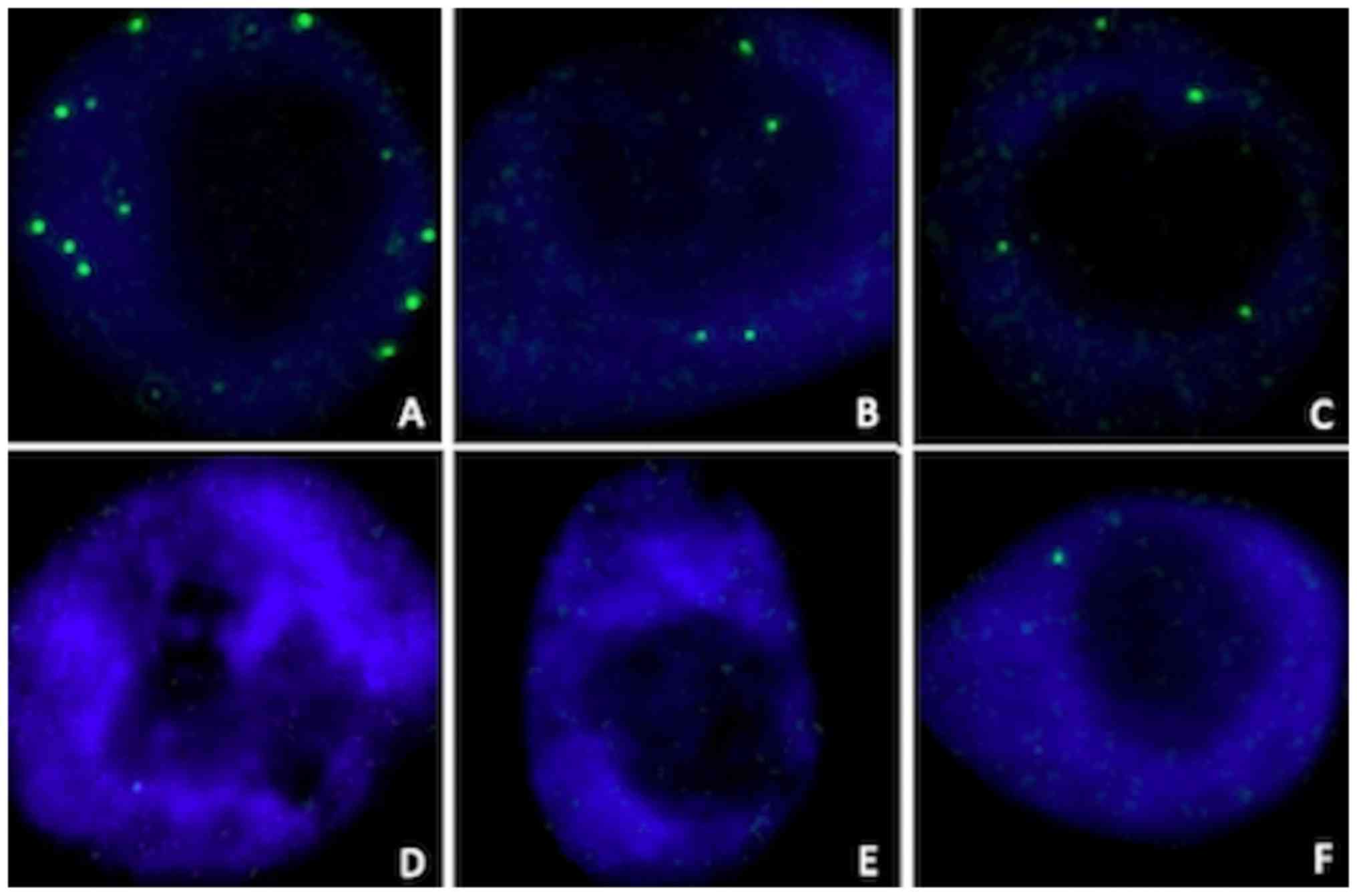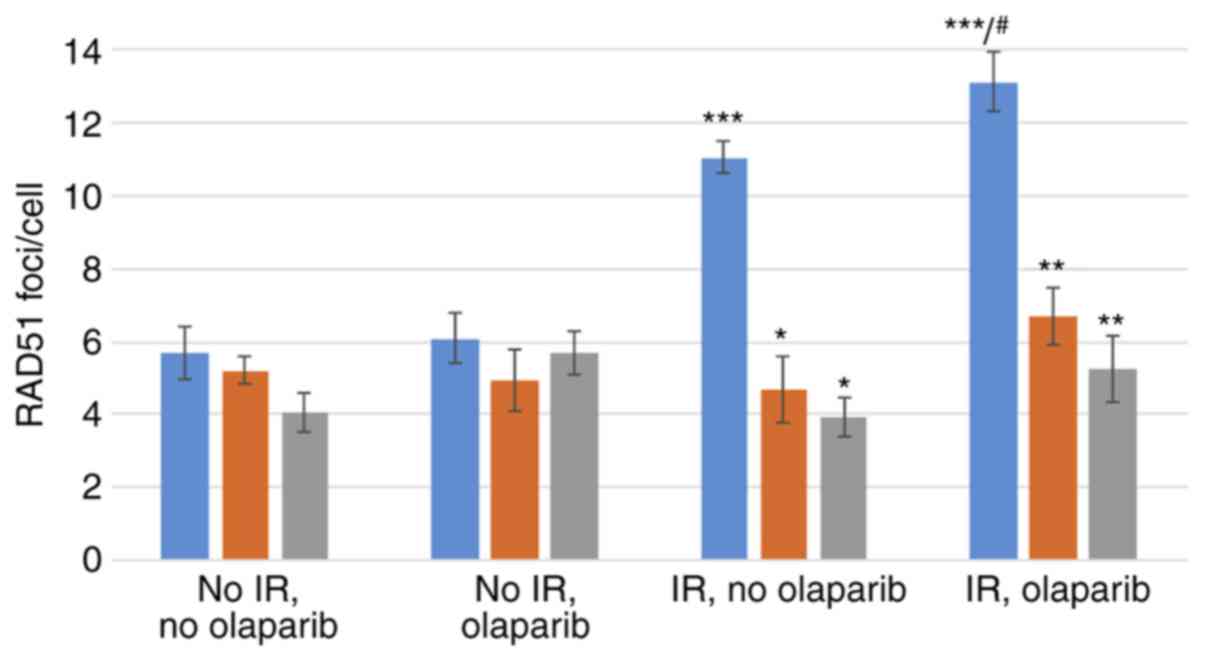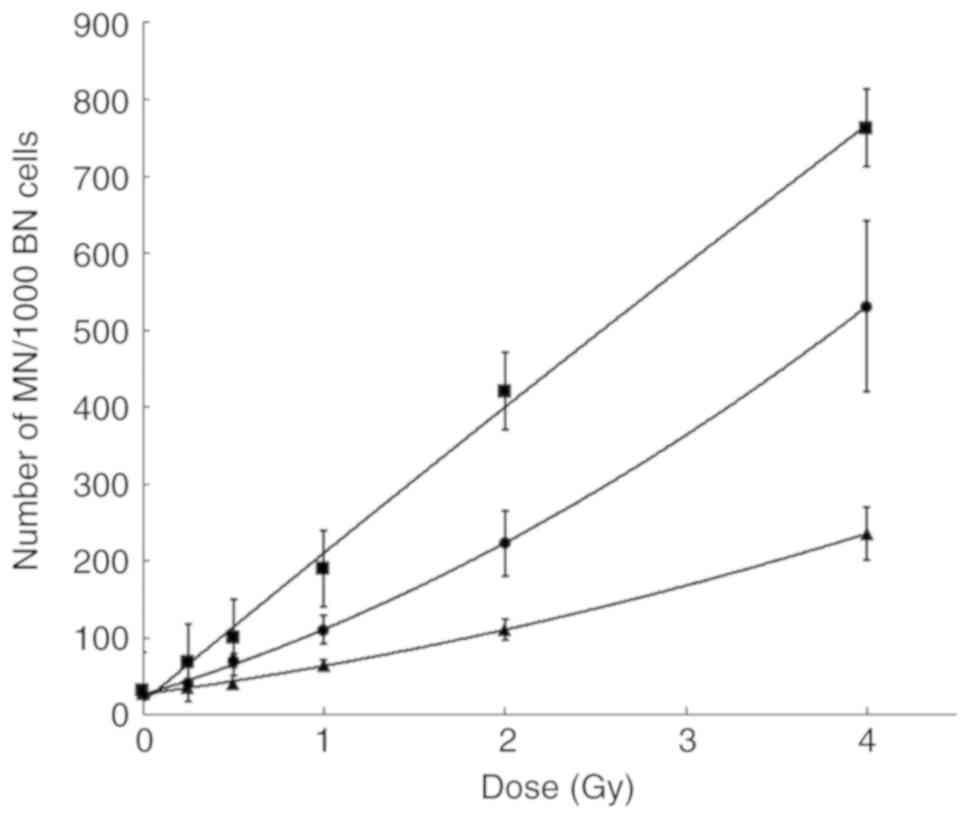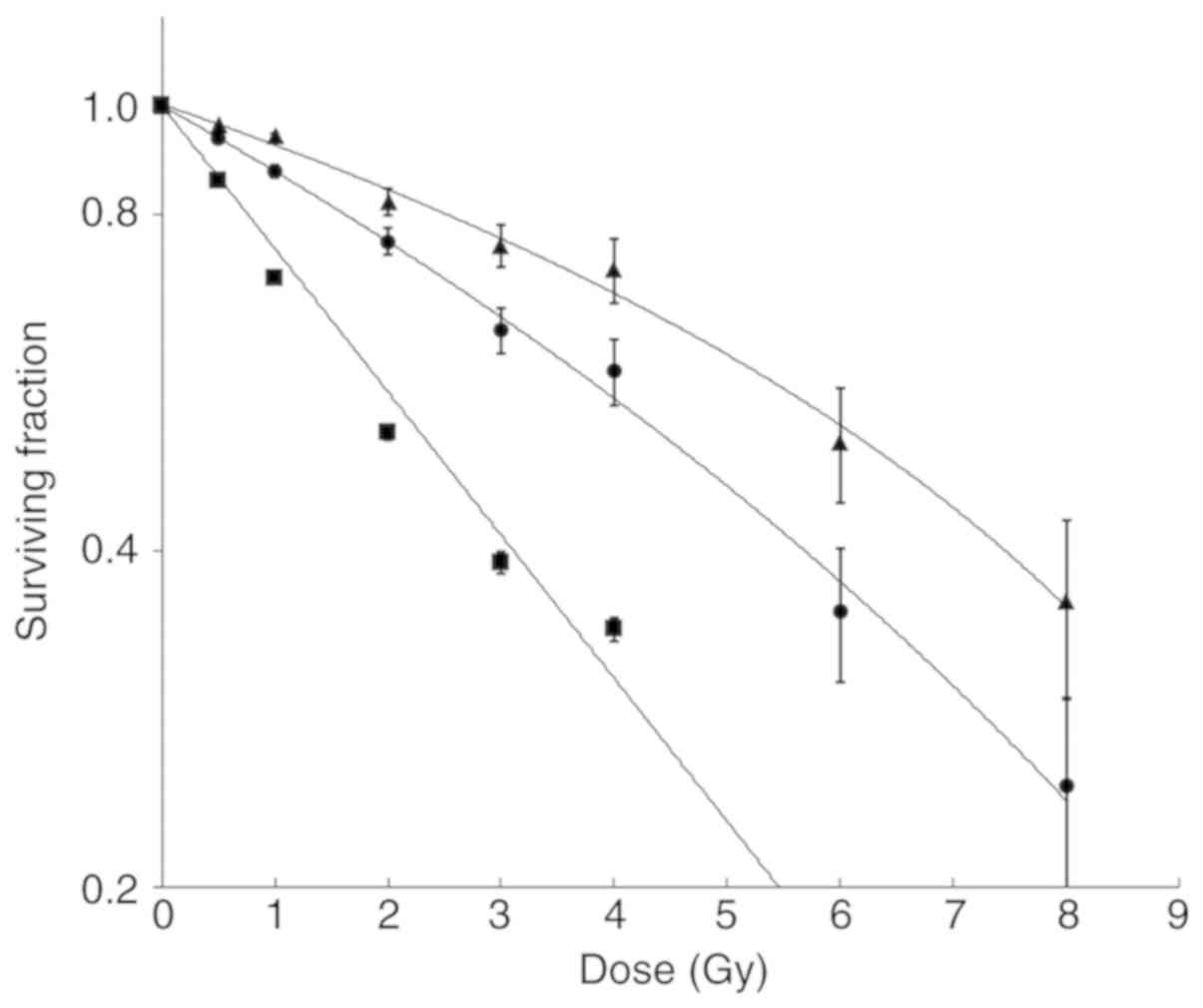|
1
|
Roy R, Chun J and Powell SN: BRCA1 and
BRCA2: Different roles in a common pathway of genome protection.
Nat Rev Cancer. 12:68–78. 2011.PubMed/NCBI View
Article : Google Scholar
|
|
2
|
Mao Z, Bozzella M, Seluanov A and
Gorbunova V: DNA repair by nonhomologous end joining and homologous
recombination during cell cycle in human cells. Cell Cycle.
7:2902–2906. 2008.PubMed/NCBI View Article : Google Scholar
|
|
3
|
Pijpe A, Andrieu N, Easton DF, Kesminiene
A, Cardis E, Noguès C, Gauthier-Villars M, Lasset C, Fricker JP,
Peock S, et al: Exposure to diagnostic radiation and risk of breast
cancer among carriers of BRCA1/2 mutations: Retrospective cohort
study (GENE-RAD-RISK). BMJ. 345(e5660)2012.PubMed/NCBI View Article : Google Scholar
|
|
4
|
Andrieu N, Easton DF, Chang-Claude J,
Rookus MA, Brohet R, Cardis E, Antoniou AC, Wagner T, Simard J,
Evans G, et al: Effect of chest X-rays on the risk of breast cancer
among BRCA1/2 mutation carriers in the international BRCA1/2
carrier cohort study: A report from the EMBRACE, GENEPSO,
GEO-HEBON, and IBCCS Collaborators' Group. J Clin Oncol.
24:3361–3366. 2006.PubMed/NCBI View Article : Google Scholar
|
|
5
|
John EM, McGuire V, Thomas D, Haile R,
Ozcelik H, Milne RL, Felberg A, West DW, Miron A, Knight JA, et al:
Diagnostic chest X-rays and breast cancer risk before age 50 years
for BRCA1 and BRCA2 mutation carriers. Cancer Epidemiol Biomarkers
Prev. 22:1547–1556. 2013.PubMed/NCBI View Article : Google Scholar
|
|
6
|
Narod SA, Lubinski J, Ghadirian P, Lynch
HT, Moller P, Foulkes WD, Rosen B, Kim-Sing C, Isaacs C, Domchek S,
et al: Screening mammography and risk of breast cancer in BRCA1 and
BRCA2 mutation carriers: A case-control study. Lancet Oncol.
7:402–406. 2006.PubMed/NCBI View Article : Google Scholar
|
|
7
|
Giannakeas V, Lubinski J, Gronwald J,
Moller P, Armel S, Lynch HT, Foulkes WD, Kim-Sing C, Singer C,
Neuhausen SL, et al: Mammography screening and the risk of breast
cancer in BRCA1 and BRCA2 mutation carriers: A prospective study.
Breast Cancer Res Treat. 147:113–118. 2014.PubMed/NCBI View Article : Google Scholar
|
|
8
|
Bernstein JL, Thomas DC, Shore RE, Robson
M, Boice JD Jr, Stovall M, Andersson M, Bernstein L, Malone KE,
Reiner AS, et al: Contralateral breast cancer after radiotherapy
among BRCA1 and BRCA2 mutation carriers: A WECARE study report. Eur
J Cancer. 49:2979–2985. 2013.PubMed/NCBI View Article : Google Scholar
|
|
9
|
Broeks A, Braaf LM, Huseinovic A, Nooijen
A, Urbanus J, Hogervorst FB, Schmidt MK, Klijn JG, Russell NS, Van
Leeuwen FE and Van 't Veer LJ: Identification of women with an
increased risk of developing radiation-induced breast cancer: A
case only study. Breast Cancer Res. 9(R26)2007.PubMed/NCBI View
Article : Google Scholar
|
|
10
|
Baeyens A, Thierens H, Claes K, Poppe B,
de Ridder L and Vral A: Chromosomal radiosensitivity in BRCA1 and
BRCA2 mutation carriers. Int J Radiat Biol. 80:745–756.
2004.PubMed/NCBI View Article : Google Scholar
|
|
11
|
Gutiérrez-Enríquez S, Ramón Y, Cajal T,
Alonso C, Corral A, Carrasco P, Cornet M, Sanz J, Ribas M, Baiget M
and Diez O: Ionizing radiation or mitomycin-induced micronuclei in
lymphocytes of BRCA1 or BRCA2 mutation carriers. Breast Cancer Res
Treat. 127:611–622. 2011.PubMed/NCBI View Article : Google Scholar
|
|
12
|
Trenz K, Rothfuss A, Schütz P and Speit G:
Mutagen sensitivity of peripheral blood from women carrying a BRCA1
or BRCA2 mutation. Mutat Res. 500:89–96. 2002.PubMed/NCBI View Article : Google Scholar
|
|
13
|
Ernestos B, Nikolaos P, Koulis G, Eleni R,
Konstantinos B, Alexandra G and Michael K: Increased chromosomal
radiosensitivity in women carrying BRCA1/BRCA2 mutations assessed
with the G2 assay. Int J Radiat Oncol Biol Phys. 76:1199–1205.
2010.PubMed/NCBI View Article : Google Scholar
|
|
14
|
Becker AA, Graeser MK, Landwehr C, Hilger
T, Baus W, Wappenschmidt B, Meindl A, Weber RG and Schmutzler RK: A
24-color metaphase-based radiation assay discriminates heterozygous
BRCA2 mutation carriers from controls by chromosomal
radiosensitivity. Breast Cancer Res Treat. 135:167–175.
2012.PubMed/NCBI View Article : Google Scholar
|
|
15
|
Kote-Jarai Z, Salmon A, Mengitsu T,
Copeland M, Ardern-Jones A, Locke I, Shanley S, Summersgill B, Lu
YJ, Shipley J and Eeles R: Increased level of chromosomal damage
after irradiation of lymphocytes from BRCA1 mutation carriers. Br J
Cancer. 94:308–310. 2006.PubMed/NCBI View Article : Google Scholar
|
|
16
|
Frankenberg-Schwager M and Gregus A:
Chromosomal instability induced by mammography X-rays in primary
human fibroblasts from BRCA1 and BRCA2 mutation carriers. Int J
Radiat Biol. 88:846–857. 2012.PubMed/NCBI View Article : Google Scholar
|
|
17
|
Barwell J, Pangon L, Georgiou A, Kesterton
I, Langman C, Arden-Jones A, Bancroft E, Salmon A, Locke I,
Kote-Jarai Z, et al: Lymphocyte radiosensitivity in BRCA1 and BRCA2
mutation carriers and implications for breast cancer
susceptibility. Int J Cancer. 121:1631–1636. 2007.PubMed/NCBI View Article : Google Scholar
|
|
18
|
Baert A, Depuydt J, Van Maerken T, Poppe
B, Malfait F, Storm K, van den Ende J, Van Damme T, De Nobele S,
Perletti G, et al: Increased chromosomal radiosensitivity in
asymptomatic carriers of a heterozygous BRCA1 mutation. Breast
Cancer Res. 18(52)2016.PubMed/NCBI View Article : Google Scholar
|
|
19
|
Baert A, Depuydt J, Van Maerken T, Poppe
B, Malfait F, Van Damme T, De Nobele S, Perletti G, De Leeneer K,
Claes KB and Vral A: Analysis of chromosomal radiosensitivity of
healthy BRCA2 mutation carriers and non-carriers in BRCA families
with the G2 micronucleus assay. Oncol Rep. 37:1379–1386.
2017.PubMed/NCBI View Article : Google Scholar
|
|
20
|
O'Keefe EP: siRNAs and shRNAS: Tools for
protein knockdown by Gene Silencing. Mater Methods. 3(197)2013.
View Article : Google Scholar
|
|
21
|
Navaraj A, Finnberg N, Dicker DT, Yang W,
Matthew EM and El-Deiry WS: Reduced cell death, invasive and
angiogenic features conferred by BRCA1-deficiency in mammary
epithelial cells transformed with H-Ras. Cancer Biol Ther.
8:2417–2444. 2009.PubMed/NCBI View Article : Google Scholar
|
|
22
|
Hellemans J, Mortier G, De Paepe A,
Speleman F and Vandesompele J: qBase relative quantification
framework and software for management and automated analysis of
real-time quantitative PCR data. Genome Biol. 8(R19)2007.PubMed/NCBI View Article : Google Scholar
|
|
23
|
Livak KJ and Schmittgen TD: Analysis of
relative gene expression data using real-time quantitative PCR and
the 2(-Delta Delta C(T)) method. Methods. 25:402–408.
2001.PubMed/NCBI View Article : Google Scholar
|
|
24
|
Li J and Xu X: DNA double-strand break
repair: A tale of pathway choices. Acta Biochim Biophys Sin
(Shanghai). 48:641–646. 2016.PubMed/NCBI View Article : Google Scholar
|
|
25
|
Mladenov E, Magin S, Soni A and Iliakis G:
DNA double-strand-break repair in higher eukaryotes and its role in
genomic instability and cancer: Cell cycle and
proliferation-dependent regulation. Semin Cancer Biol. 37-38:51–64.
2016.PubMed/NCBI View Article : Google Scholar
|
|
26
|
Ceccaldi R, Rondinelli B and D'Andrea AD:
Repair pathway choices and consequences at the double-strand break.
Trends Cell Biol. 26:52–64. 2016.PubMed/NCBI View Article : Google Scholar
|
|
27
|
Rothkamm K, Barnard S, Moquet J, Ellender
M, Rana Z and Burdak-Rothkamm S: DNA damage foci: Meaning and
significance. Environ Mol Mutagen. 56:491–504. 2015.PubMed/NCBI View Article : Google Scholar
|
|
28
|
Willers H, Taghian AG, Luo CM,
Treszezamsky A, Sgroi DC and Powell SN: Utility of DNA repair
protein foci for the detection of putative BRCA1 pathway defects in
breast cancer biopsies. Mol Cancer Res. 7:1304–1309.
2009.PubMed/NCBI View Article : Google Scholar
|
|
29
|
Vaclová T, Gómez-López G, Setién F, Bueno
JM, Macías JA, Barroso A, Urioste M, Esteller M, Benítez J and
Osorio A: DNA repair capacity is impaired in healthy BRCA1
heterozygous mutation carriers. Breast Cancer Res Treat.
152:271–282. 2015.PubMed/NCBI View Article : Google Scholar
|
|
30
|
Sioftanos G, Ismail A, Föhse L, Shanley S,
Worku M and Short SC: BRCA1 and BRCA2 heterozygosity in embryonic
stem cells reduces radiation-induced Rad51 focus formation but is
not associated with radiosensitivity. Int J Radiat Biol.
86:1095–1105. 2010.PubMed/NCBI View Article : Google Scholar
|
|
31
|
Naipal KA, Verkaik NS, Ameziane N, van
Deurzen CH, Ter Brugge P, Meijers M, Sieuwerts AM, Martens JW,
O'Connor MJ, Vrieling H, et al: Functional ex vivo assay to select
homologous recombination-deficient breast tumors for PARP inhibitor
treatment. Clin Cancer Res. 20:4816–4826. 2014.PubMed/NCBI View Article : Google Scholar
|
|
32
|
AlHilli MM, Becker MA, Weroha SJ, Flatten
KS, Hurley RM, Harrell MI, Oberg AL, Maurer MJ, Hawthorne KM, Hou
X, et al: In vivo anti-tumor activity of the PARP inhibitor
niraparib in homologous recombination deficient and proficient
ovarian carcinoma. Gynecol Oncol. 143:379–388. 2016.PubMed/NCBI View Article : Google Scholar
|
|
33
|
Mukhopadhyay A, Elattar A, Cerbinskaite A,
Wilkinson SJ, Drew Y, Kyle S, Los G, Hostomsky Z, Edmondson RJ and
Curtin NJ: Development of a functional assay for homologous
recombination status in primary cultures of epithelial ovarian
tumor and correlation with sensitivity to poly(ADP-ribose)
polymerase inhibitors. Clin Cancer Res. 16:2344–2351.
2010.PubMed/NCBI View Article : Google Scholar
|
|
34
|
Depuydt J, Baert A, Vandersickel V,
Thierens H and Vral A: Relative biological effectiveness of
mammography X-rays at the level of DNA and chromosomes in
lymphocytes. Int J Radiat Biol. 89:532–538. 2013.PubMed/NCBI View Article : Google Scholar
|
|
35
|
Barazzuol L, Jena R, Burnet NG, Meira LB,
Jeynes JC, Kirkby KJ and Kirkby NF: Evaluation of poly (ADP-ribose)
polymerase inhibitor ABT-888 combined with radiotherapy and
temozolomide in glioblastoma. Radiat Oncol. 8(65)2013.PubMed/NCBI View Article : Google Scholar
|
|
36
|
Vandersickel V, Mancini M, Slabbert J,
Marras E, Thierens H, Perletti G and Vral A: The radiosensitizing
effect of Ku70/80 knockdown in MCF10A cells irradiated with X-rays
and p(66)+Be(40) neutrons. Radiat Oncol. 5(30)2010.PubMed/NCBI View Article : Google Scholar
|
|
37
|
Vandersickel V, Slabbert J, Thierens H and
Vral A: Comparison of the colony formation and crystal violet cell
proliferation assays to determine cellular radiosensitivity in a
repair-deficient MCF10A cell line. Radiat Measurements. 46:72–75.
2011. View Article : Google Scholar
|
|
38
|
Slabbert JP, Theron T, Serafin A, Jones
DT, Böhm L and Schmitt G: Radiosensitivity variations in human
tumor cell lines exposed in vitro to p(66)/Be neutrons or 60Co
gamma-rays. Strahlenther Onkol. 172:567–572. 1996.PubMed/NCBI
|
|
39
|
Imbalzano KM, Tatarkova I, Imbalzano AN
and Nickerson JA: Increasingly transformed MCF-10A cells have a
progressively tumor-like phenotype in three-dimensional basement
membrane culture. Cancer Cell Int. 9(7)2009.PubMed/NCBI View Article : Google Scholar
|
|
40
|
Sedic M and Kuperwasser C:
BRCA1-hapoinsufficiency: Unraveling the molecular and cellular
basis for tissue-specific cancer. Cell Cycle. 15:621–627.
2016.PubMed/NCBI View Article : Google Scholar
|
|
41
|
Warren M, Lord CJ, Masabanda J, Griffin D
and Ashworth A: Phenotypic effects of heterozygosity for a BRCA2
mutation. Hum Mol Genet. 12:2645–2656. 2003.PubMed/NCBI View Article : Google Scholar
|
|
42
|
Kraakman-van der Zwet M, Overkamp WJ, van
Lange RE, Essers J, van Duijn-Goedhart A, Wiggers I, Swaminathan S,
van Buul PP, Errami A, Tan RT, et al: Brca2 (XRCC11) deficiency
results in radioresistant DNA synthesis and a higher frequency of
spontaneous deletions. Mol Cell Biol. 22:669–679. 2002.PubMed/NCBI View Article : Google Scholar
|
|
43
|
Yuan SS, Lee SY, Chen G, Song M, Tomlinson
GE and Lee EY: BRCA2 is required for ionizing radiation-induced
assembly of Rad51 complex in vivo. Cancer Res. 59:3547–3551.
1999.PubMed/NCBI
|
|
44
|
Keimling M, Volcic M, Csernok A, Wieland
B, Dörk T and Wiesmüller L: Functional characterization connects
individual patient mutations in ataxia telangiectasia mutated (ATM)
with dysfunction of specific DNA double-strand break-repair
signaling pathways. FASEB J. 25:3849–3860. 2011.PubMed/NCBI View Article : Google Scholar
|
|
45
|
Pathania S, Bade S, Le Guillou M, Burke K,
Reed R, Bowman-Colin C, Su Y, Ting DT, Polyak K, Richardson AL, et
al: BRCA1 haploinsufficiency for replication stress suppression in
primary cells. Nat Commun. 5(5496)2014.PubMed/NCBI View Article : Google Scholar
|
|
46
|
Karanam K, Kafri R, Loewer A and Lahav G:
Quantitative live cell imaging reveals a gradual shift between DNA
repair mechanisms and a maximal use of HR in mid S phase. Mol Cell.
47:320–329. 2012.PubMed/NCBI View Article : Google Scholar
|
|
47
|
Erratum for the Perspective: ‘Laying a
trap to kill cancer cells: PARP inhibitors and their mechanisms of
action’ by Y. Pommier, M. J. O'Connor, J. de Bono. Sci Transl Med
8: 368er7, 2016.
|
|
48
|
Khodyreva SN and Lavrik OI:
Poly(ADP-Ribose) polymerase 1 as a key regulator of DNA repair. Mol
Biol (Mosk). 50:655–673. 2016.(In Russian). PubMed/NCBI View Article : Google Scholar
|
|
49
|
Murai J, Huang SY, Das BB, Renaud A, Zhang
Y, Doroshow JH, Ji J, Takeda S and Pommier Y: Trapping of PARP1 and
PARP2 by clinical PARP inhibitors. Cancer Res. 72:5588–5599.
2012.PubMed/NCBI View Article : Google Scholar
|















